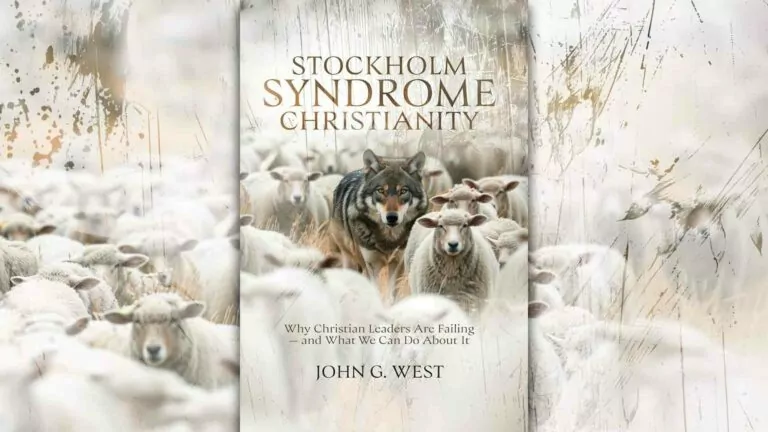Why America’s Christian leaders are failing – and what we can do about it
by John G. West
2025 / 348 pages
While it is common to blame atheists and agnostics for the current wave of secularism, author John G. West convincingly points out that Christian leaders are to their shame playing a key role in the demise of Christian influence in today’s society.
The “Stockholm Syndrome” his book title refers to is “the psychological tendency of a hostage to bond with, identify with, or sympathize with his or her captor” (Merriam-Webster). West notes that most Christians are immersed or captive in a culture that is hostile to biblical Christianity. After being immersed in such an environment for years, it becomes easier for Christians to identify with the thinking of those who reject historic Christian norms and principles and eventually to actually adopt as one’s view that which one first rejected. A recent example of this development is how the former Reformed Churches (Liberated) in the Netherlands, which used to belong to the International Conference of Reformed Churches, have over the last few years abandoned biblical norms and have most recently even welcomed those who practice a homosexual lifestyle to the Lord’s Supper, and opened all the ecclesiastical offices to them. The leaders of these Dutch churches have succumbed to Stockholm Syndrome and adopted the views of those with whom they had first disagreed because they were against Scripture. But now the biblical norms are explained away and the views of those hostile to Christianity have been adopted.
Evolution is acid
There is too much good material in this book to reflect on in a brief review. So let me simply mention two points to give a flavor of this publication. In the first place, West shows how this syndrome is at work in all areas of life, including one’s views on sex, race, and liberty, but a pervasive underlying factor is the acceptance of the theory of the evolutionary beginning of creation and the worldview that results from it. When reality is seen through the lens of evolution the consequences are enormous and destructive for a Christian worldview. The biblical doctrine of creation is critical and abandoning it has disastrous results. Accepting current evolutionary theory of the earth and humanity’s beginning means, to mention but two consequences, that there was no fall into sin and so no need for redemption and that moral standards are ultimately not from heaven but from nature. The morals have evolved over time as determined by the need to survive. There are no absolute moral standards. It is therefore hugely tragic that prominent Christians like scientist Francis Collins and the late theologian Tim Keller made concerted efforts to promote the acceptance of evolution among Christians through BioLogos, an organization that promotes evolution in Christian circles, and through other means. West details how these men have facilitated and contributed to the acceptance of unbiblical notions among Christians and the devastating consequences that followed.
Approval of the (academic) world
A second area that West underlines is the need for Christian leaders and scholars to resist the temptation of seeking the acceptance of secular scholars and authorities. This urge to please can lead to compromising biblical truth. West takes the well-known evangelical historian Mark Noll as an example of the pitfalls involved. Noll famously published The Scandal of the Evangelical Mind (1994) in which he berated evangelicals of shoddy scholarship and anti-intellectualism. West notes however that,
“some of the particulars of Noll’s indictment were troubling. Take his identification of ‘biblicism’ (which he defined as ‘reliance on the Bible as ultimate religious authority’) as one of the obstacles to evangelical scholarship. Noll seemed to suggest that the only way ‘the life of the mind may have a chance’ among evangelicals was if they restricted the Bible’s authority to ‘pointing us to the Savior and… orienting our entire existence to the service of God.’”
West goes on to note that “that may sound good, but it actually leaves out quite a lot. What about the Bible’s accounts of God’s actions in history, starting with the Old Testament,” including “his creation of the world and mankind and the particulars of the moral law?” (Noll, like Tim Keller and Francis Collins, supports the work of BioLogos). He observes that “perhaps the biggest problem with Noll’s book was that it fed a lust for secular approval among many evangelical intellectuals.”
Conclusion
West’s book is fittingly dedicated to Francis Schaeffer (1912-1984) who indicted evangelicals for seeking to accommodate their Christian faith to the thought forms and teachings of secular culture. In his The Great Evangelical Disaster, Schaeffer warned that “Accommodation leads to accommodation – which leads to accommodation.” Not accommodation, but confrontation to unbiblical views is what is needed.
This is a most timely wakeup call and a must-read simply because West hits an issue that is vitally important for Christians, especially leaders. May his call to biblical faithfulness be heeded.
Cornelis Van Dam is emeritus Professor of Old Testament at the Canadian Reformed Theological Seminary and author, among others, of “In the Beginning: Listening to Genesis 1 and 2.”












